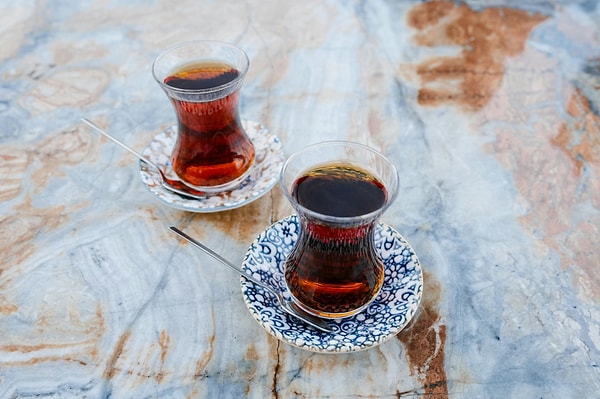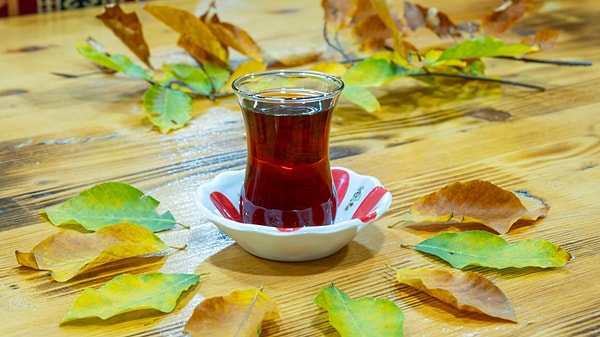All You Need to Know About Turkish Cay (Tea): History, Culture, and Rituals
Turkish tea is a unique beverage that has left a deep mark on Turkey's cultural identity and is intertwined with tradition. It is carefully prepared from black tea leaves grown in the fertile lands of the Eastern Black Sea region. With its unique brewing method, special teapot, presentation in a thin-stemmed glass, and symbolic meaning, Turkish tea is not only a taste sensation but also a way of life. So, what is special about Turkish tea? And how to make Turkish?
The Origins and History of Turkish Tea

The history of tea dates back as far as human history itself. Discovered in 2700 BC when leaves fell into the hot water of Chinese Emperor Shenn Nung, this beverage spread throughout the world over the centuries. The Turkish people first encountered tea in the 19th century. The ‘Çay Risalesi’ (Treatise on Tea), published in 1879, was one of the first steps in introducing tea to society.
Tea cultivation in Turkey gained momentum during the Republican era. Law No. 407, enacted in 1924, encouraged tea production in Rize and its surroundings. As a result of the efforts led by Zihni Derin, the first tea seedlings were planted in the 1930s, and Turkey's first tea factory began operating in Rize in 1947. Today, Turkey is the world leader in per capita tea consumption and ranks among the top four countries in production. Annual per capita consumption ranges from approximately 3.5 to 4 kilograms.
Cultural Significance and Social Role: Turkish Tea Culture

Turkish tea culture is not merely a ritual of drinking. It is at the very heart of conversations, friendships, hospitality, and daily life. It accompanies every hour of the day, from morning breakfast to evening conversations.
In 2022, UNESCO recognised Turkish tea culture as ‘Intangible Cultural Heritage,’ honouring this unique tradition on a global scale. The way tea is consumed may vary across Turkey. For example, in Erzurum, the ‘kıtlama tea’ tradition involves dissolving sugar under the tongue before drinking the tea. In Anatolia, tea is the most fundamental expression of hospitality. When entering a home, tea is the first thing offered, and refusing it is almost considered disrespectful.
Tea also holds an important place in the workplace. The tea kettle and tea server have become an integral part of the corporate structure. The phrase ‘have some tea’ is also a call for a break, a moment to breathe, and socialising.
How to Prepare Turkish Tea: The Art of Brewing

The technique of brewing Turkish tea requires patience, care and skill. The quality of the tea is as important as the brewing method in determining its flavour.
The preparation steps are as follows:
Traditionally, a two-tiered teapot is used. Water is boiled in the lower teapot, and dry tea is added to the upper teapot.
A portion of the boiled water is added to the upper teapot to brew the tea. The remaining water in the lower teapot is then used to dilute the tea to the desired strength in the cup.
The brewing time is approximately 15-20 minutes. Tea brewed for too long becomes bitter, while tea brewed for too short a time is bland. It is important to achieve the ideal brewing time.
During service, tea is offered as ‘light,’ ‘medium,’ or ‘strong’ depending on its colour. The tea ratio may vary according to individual taste preferences.
Tea served in a glass cup with a narrow waist offers both visual and sensory pleasure. The narrow waist shape keeps the tea warm for a long time, while the colour of the tea can be observed aesthetically.
The Characteristics of Turkish Tea and How It Differs from Other Teas

Turkish tea is distinctly different from other types of black tea known around the world. The most noticeable difference is the brewing method. Unlike English tea, it is not served with milk; it is plain, dark and aromatic.
The humid climate and volcanic soil structure of the Black Sea region give the tea leaves a strong aroma and distinctive flavour.
Its caffeine content is moderate to high. Therefore, it provides alertness while leaving a milder effect compared to coffee.
Milk, lemon, or flavouring agents are rarely used. Turkish tea stands out for its naturalness and simplicity.
While tea is typically prepared using a single teapot in global tea cultures, Turkey follows the tradition of using a double teapot, a method that significantly influences the taste of the tea.
Turkish Tea in Terms of Health and Enjoyment

The benefits of Turkish tea make it not only a cultural choice but also a healthy beverage option:
It is rich in antioxidants. Regular consumption contributes to the immune system.
It helps meet daily fluid requirements.
It is gentler on the stomach than coffee due to its lower acidity.
It enhances concentration and mental alertness.
Drinking tea is not just a habit; it can also be a practice of mindfulness. The ritual that begins with the brewing process transforms into a soothing experience for the soul, accompanied by conversation and the warmth of the cup in your hands.
Why Should You Drink Turkish Tea?

Turkish tea is not just a beverage; it is a habit that warms the soul, a cultural experience, and a healthy choice. There are many reasons to choose this traditional beverage, which has become an indispensable part of daily life. Here are comprehensive answers to the question of why you should drink Turkish tea:
1. Participating in a Cultural Ritual
Drinking Turkish tea means participating in a tradition that dates back thousands of years. In Turkey, tea is not just a liquid; it is a symbol of mutual understanding, conversation, and sincerity. Offering tea is a way of saying “welcome” in many social settings, from home visits to business meetings.
2. Natural and Pure Flavour
Turkish tea, grown in the fertile lands of the Eastern Black Sea region, contains no additives or artificial flavours. It offers a pure, natural taste. It is an ideal choice for those who want to experience the true essence of tea, free from industrial sweeteners.
3. Powerful Source of Antioxidants
Turkish black tea is rich in antioxidants. These compounds combat free radicals in the body, supporting the immune system and slowing cellular ageing. They may also have positive effects on heart health.
4. Balanced Alertness with Caffeine
Turkish tea, which offers a milder stimulant effect than coffee, is an ideal drink for clearing the mind and increasing focus. Drinking several cups of Turkish tea throughout the day can help you maintain both your mental and physical energy.
5. Encourages Socialising
Tea is not drunk alone in Turkey. It accompanies friendships between two people, crowded tables, or a lonely afternoon. The phrase ‘pour me some tea’ is not just a request for a drink, but also a call for sharing.
6. Contributes to Mental and Spiritual Health
From the brewing process to drinking, tea encourages slowing down and living in the moment. In this sense, it can also be considered a type of mindfulness practice. The warmth, aroma, colour, and sip-by-sip drinking of tea support mental calmness.
7. Suitable for Every Season, Perfect for Every Moment
Turkish tea, a warming companion in winter and a light, refreshing alternative in summer, can be enjoyed year-round. From morning breakfast to evening conversations, it finds its place anytime and anywhere.
Keşfet ile ziyaret ettiğin tüm kategorileri tek akışta gör!

Send Comment